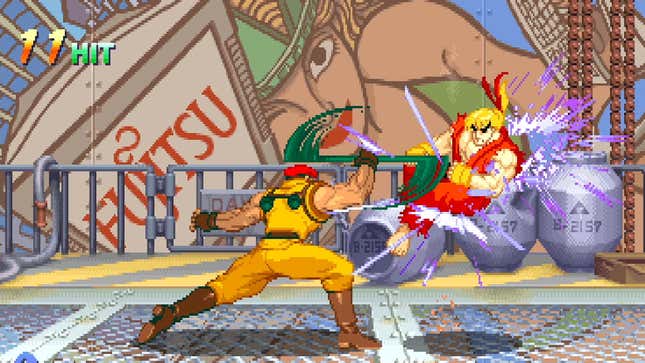
Modern fighting games are often decried for what’s called “comeback mechanics,” which are thought to be absent from the more “honest” classic fighters. But those complaints ignore that the genre has always been (and I say this with all the love and respect in my heart) full of bullshit. Case in point: 1996’s Street Fighter Alpha 2, one of the best fighting games of all time, gives players who are behind in the round count a small damage boost.
Fighting game community veteran Scott “SaBrE” Bender confirmed as much earlier this week. In the days before training modes and leisurely experimentation, strong players simply intuited that Street Fighter Alpha 2 granted a damage boost to players who are behind in rounds. But things like that were much harder to test when the game was only available in arcades.
“[I] decided to see if an old Street Fighter Alpha 2 theory was true,” Bender said on Twitter earlier this week. [Street Fighter champion Alex Valle] claimed that the loser of round one gets a damage buff in round two. [I] can confirm, the loser gets a one-point damage buff per hit.”
That might not sound like a whole lot, but Bender goes on to explain that this buff greatly benefits characters that can rack up combos using attacks with multiple hits. The comparison he provides of the damage done by Rolento’s Patriot Circle in round one, versus round two after a round one loss, for example, is particularly striking. The attack’s 11 hits amount to 11 more points of damage, which can be significant under the right circumstances.
“I knew about the damage boost early into [Street Fighter Alpha 2],” Valle responded. “I didn’t know the specifics of percentages, but it was easy to see the damage disparity when you’re playing shoto mirrors in round two. Good stuff on breaking down the specifics!” (“Shotos” here refers to fireball- and dragon punch-using characters like Ryu, Ken, and Akuma.)
Sure, Street Fighter Alpha 2’s hidden damage buff isn’t quite as significant as Ultimate Marvel vs. Capcom 3’s X-Factor, which greatly boosts a character’s damage and speed while also regenerating health, but Bender’s confirmation of its existence is important. It serves as a good reminder that fighting games have always had quirks that make them less about providing a completely equitable space for competition and more about learning how to adapt to any given situation.
And let’s be honest: It just feels really good to beat someone in a fighting game, no matter the circumstances. So bring on the comeback mechanics!